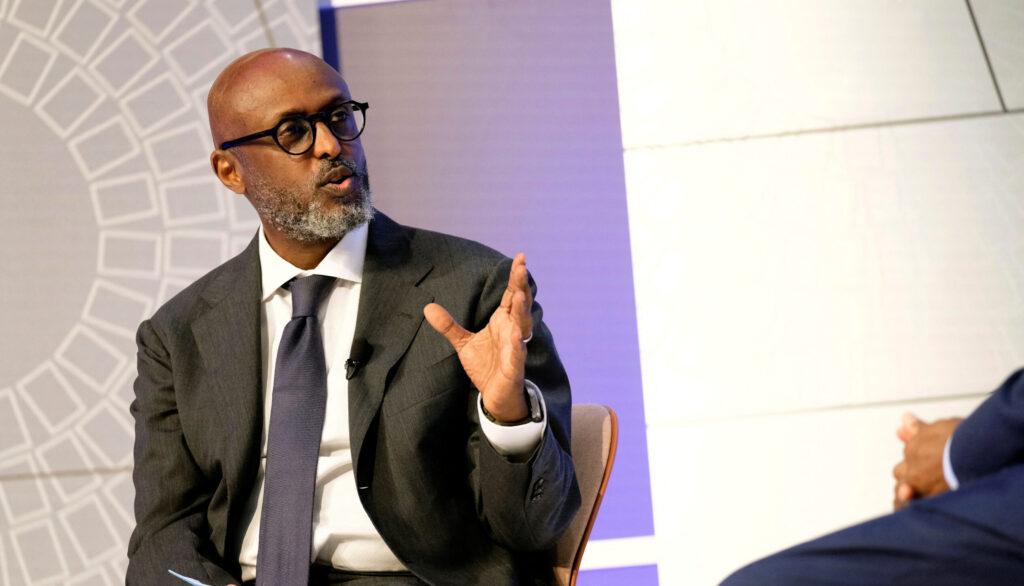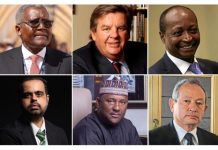
Africa-Press – Mauritius. Over the last 15 years, Africa has become integrated into the global economic fold.
As a result, it is no longer immune to volatility in international markets; while the continent was largely cushioned from the fallout of the Global Financial Crisis in 2008, over the last 12 months, rising inflation, interest rate hikes, and broken supply chains, which have wreaked havoc in developed economies, are now taking their toll on Africa.
Layered on top of the economic crisis is a climate emergency, which has caused drought, flooding, and conflict across the continent. The acceleration of climate change has hit Africa hard, exacerbating the current cost of living crisis and plunging thousands of people into poverty.
Cash-strapped economies have more or less been shut out of global international markets, with yields too high for most to consider borrowing this way.
Mounting debt obligations during this current economic crisis will only put more pressure on governments as they tackle the cost of living crisis and climate change.
With so much uncertainty, and dwindling portfolio flows to the continent, the role of multilateral agencies to help prop up the developing economies of Africa is needed now more than ever before. Deals, however, will take time and negotiations require compromise.
In an exclusive interview, Abebe Aemro Selassie, director of the African Department at the IMF sets out the institution’s plan to temper the current crisis and provides a blueprint for Africa’s future growth.
Today, it is no secret that African countries have very high debt levels, but with interest rates rising, it’s increasingly difficult to get financing.
What’s the call to action for African governments? Abebe Selassie: I think the first point to make is that this higher cost of funding is not unique to Africa, but our countries are facing it with much more acuity.
It’s a global phenomenon, rising inflation. Investors are not wanting to take too much risk as there are even more uncertainties. in the face of this, what are the options for our countries? For the last couple of years, the fiscal policy stance that countries have been doing has been very supportive.
In most countries, the stance has remained on a supportive footing. Given the elevated debt levels, but more generally, the higher costs of financing, I think there was always a need to ease back from that position.
Secondly, recourse to a greater reliance on concessional financing is going to be important. And then thirdly there is still a lot of scope for revenue mobilisation.
Over the last 14 to 15 years in the region of high growth, what we’ve seen is countries investing a lot in very important infrastructure projects on human capital development.
What they’ve not done as well is not capture all of the rates of return on this on these investments. I think there’s a lot more scope to rais[ing] revenues in a very progressive, efficient and equitable way.
However, at the same time, how can African countries balance the need to diversify investments to keep thriving and have enough money to keep their economies going?
This is always the existential struggle for developing countries, you have just so much development financing need, and it’s always a condition of redevelopment that you always exceed the available resources that you have.
That’s why the international community needs to provide this counter-cyclical financing more than ever, and why countries need to also make sure that they address those challenges that have persisted for a long while.
The IMF w[as] very quick out of the gates when the pandemic hit because we knew that there would be incredible financing gaps that countries would face; so as far back as October 2020, we were putting out studies reports, advocating the need for the international community to provide a lot of financing.
We had the SPR allocation, which provided the continent with $53bn in 2021. Looking at vulnerable countries in Africa, what will the IMF response be and what areas will it focus on?
In terms of policy priorities, we are making sure that countries address food and security challenges. The pandemic affected poverty, which affected human capital accumulation.
Even when financing is not being sought, I think a lot of discussion about how we can access support from foreign aid, and the challenges that African countries face at the moment and are being squeezed by high inflation and higher food prices are important.
Right now the biggest priorities are food security, and fuel. This is an area [that] is going to be more challenging for many of our countries because it is so costly to subsidise fuel.
Of course, you can understand why governments may want to temporarily smooth the shock that comes from high food and fuel prices, but you have to find an alternative way of supporting the most vulnerable.
The IMF just released information about the Food Shock Window. How will this programme be able to help African countries? The food shock window allows us to lend to countries on an emergency basis without a cap, which was the case with emergency support following the pandemic.
Because of the cap, the only other way we would have been able to support a country when it came to us for quick financing would be to do one of our medium-term programmes, which often takes a bit of time to negotiate.
now we have flexibility in the toolkits that we have and countries now have the option if they really need the money and resources immediately. We still have around 23 regular programmes in the region and we also have the option to augment those in those countries where we’ve seen significant needs.
How does the Common Framework work now? Is there a parallel between the one that was in place during the pandemic and the one in the current framework?
The Common Framework is a creditor coordination mechanism amongst bilateral official creditors. So far, there are three countries that have asked for to support for debt treatment under this common framework, Chad, Zambia and Ethiopia.
This framework is used when debt is clearly unsustainable. Zambia, is now discussing with the private creditors, and hopefully, there will be an agreement soon, but you know, we’ve been able to move forward with financing Zambia.
With Chad, we have people waiting for final assessment by official creditors, so hopefully we’ll get good news on that in the next couple of weeks. [However] in Ethiopia, because of the political difficulty and conflict, a staff-level agreement has not been reached yet.
When it does, we hope to move things forward. I think there’s a lot of misunderstanding about the Common Framework, so I will try to explain what the issues are.
In the emergency phase when the pandemic came, countries offered to suspend debt service to bilateral officials, despite official creditors, to give countries liquidity so that they can address emergency needs because our economies were being shut down.
[However] that was always a temporary measure. There was recognition that most countries can go back to norma[l] once economies recover, but for some countries that would be clearly unsustainable.
The IMF has said African countries should change their investment priorities, encouraging investment in resilient and green infrastructures. Is this the right moment to do so given the context of inflation and current turmoil?
What we focus on is looking at the implications that climate change is bringing and how climate adaptation has to be as important in poorer regions rather than climate mitigation. Why does climate change matter? Rainfall patterns have changed tremendously.
Some years where there’s very limited rain, or the rains come up at a really bad time, and some days where there’s excessive rain, so it’s exacerbating some of these tensions between pastoralists and settler farmers.
It’s exactly what is causing big shortfalls in agricultural production. So how does green investment become a top priority? There is not a minister, not a leader in the region, that isn’t worried about climate change day in and day out.
But there are huge other immediate exigencies they have to deal with on a daily basis. We cannot do it by ourselves. The international community will come in with significant climate financing, which will help them think about addressing those other medium to long-term challenges.
If there’s one thing that we learned from this pandemic, it is that these risks that we think are low frequency, low probability, are brutal. So that’s why climate and economic resilience have to be a really big important part of the agenda.
With climate resilience, there is also this will to develop the oil sector, specifically in Africa, where there’s a lack of infrastructure and higher demand.
Where does the IMF stand on this issue? These are issues that have to be seen in a very global context, and Africa’s contribution from a historic perspective is minimal.
This is not to say that African countries should not be thinking about how to future-proof and carbon-proof their investments. But I don’t think the issue with climate change right now is Africa’s contribution to climate emissions.
Instead, I think this is exactly why climate financing is so important. Climate justice is so important that we should help African countries invest in green infrastructure, but we need to provide them with the financing, so it’s very difficult to sit here and say to countries don’t invest.
Those that do I think need to reflect to be able to tell [certain] countries don’t develop this oilfield, when other countries around the world do that.
Picking on Africa, which has made zero contribution, and needs to electrify, is startling. Oil prices are due to rise again because of the decision of OPEC+ to cut production.
Will there be any positive impact of this in terms oil price rises for exporters? There are a lot of countries that stand to benefit from higher fuel prices and higher oil prices.
Unfortunately, not all are doing as much as they can because they also subsidise quite a bit. The revenues that they get by selling crude oil is eaten up by subsidies and often the higher the oil price, the higher the subsidy.
There’s also been a bit of a lag between higher oil prices and an increase in foreign exchange reserves, so the full benefits of the higher rate are going to accrue after those contracts have expired, and new ones are stuck at a higher price.
Of course, not all of them are oil exporters, but it is really important to make sure that the spirit of high oil prices, is used to help diversify the economy.
Ghana is currently negotiating a $3bn support programme with the IMF. Will an agreement will be made before the end of this year? When Ghana asked for support, we had a team on the ground within five or six days.
The team has to hear from the government, which has been working on very important homegrown programmes, which is really important because the reserve funds have to be driven by countries.
The team on the ground will hopefully finalise its initial discussions tomorrow on the government’s reform programme, and the task of the teams to identify the extent of financing that will be required, and how that’s going to be filled. We have really very hopeful that we can move forward as quickly as possible and this is going to depend on the government’s reform agenda.
For More News And Analysis About Mauritius Follow Africa-Press






